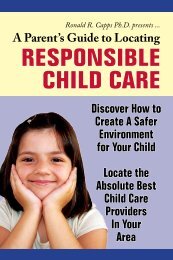Advice For Parents Of Young Autistic Children - Autism Today
Advice For Parents Of Young Autistic Children - Autism Today
Advice For Parents Of Young Autistic Children - Autism Today
You also want an ePaper? Increase the reach of your titles
YUMPU automatically turns print PDFs into web optimized ePapers that Google loves.
them to develop the social skills needed to be able to interact successfully with other children, but it is important to<br />
start early. In addition, bullying in middle and high school can be a major problem for students with autism, and the<br />
development of friendships is one of the best ways to prevent this problem.<br />
Friendships can be encouraged informally by inviting other children to the home to play. In school, recess can be a<br />
valuable time for teachers to encourage play with other children. Furthermore, time can be set aside in school for<br />
formal “play time” between children with autism and volunteer peers – typical children usually think that play time<br />
is much more fun than regular school, and it can help develop lasting friendships. This is probably one of the most<br />
important issues to include in a student’s Individualized Education Program (IEP, or education plan for the child).<br />
<strong>Children</strong> with autism often develop friendships through shared interests, such as computers, school clubs, model<br />
airplanes, etc. Encourage activities that the autistic individual can share with others. An excellent book on<br />
developing social skills is titled Relationship Development Intervention with <strong>Children</strong>, Adolescents and Adults by<br />
Steven E. Gutstein, Ph.D. and Rachelle K. Sheely.<br />
STATE SERVICES:<br />
Most states will provide some services for children with autism, primarily funded by the federal Medicaid program.<br />
Many states have waiting lists for a limited number of slots. The quality of services varies widely state to state.<br />
Most states have one set of services for children under 3 years old (early intervention), and a second set of services<br />
for older children and adults.<br />
State Services for Developmental Disabilities. Typical state services for people with autism include respite,<br />
habilitation, speech therapy, and occupational therapy. In order to qualify for services, children or adults must be<br />
diagnosed with autism (not PDD or Asperger’s, which do not qualify) by a licensed psychiatrist or psychologist with<br />
training in childhood development. Furthermore, the applicant must meet three of seven functional limitations:<br />
1) self-care<br />
2) receptive and expressive language<br />
3) learning<br />
4) mobility<br />
5) self-direction<br />
6) capacity for independent living<br />
7) economic self-sufficiency<br />
Contact your local ASA chapter to obtain more information about the developmental disabilities services in your<br />
community.<br />
Once a child is determined to be eligible, he/she may be awarded service hours. Many states have waiting lists for<br />
services, but some states provide services to everyone who qualifies. It is then up to the parent to choose a provider<br />
agency for each type of service. Speech therapists, occupational therapists, and physical therapists are in high<br />
demand, and the state pays only modest rates. Thus, it can be a challenge to find them. Similarly, it can be very<br />
challenging to find respite and habilitation providers (for an ABA program), and an even greater challenge to train<br />
and retain them. <strong>Of</strong>ten parents need to advertise for therapists, and then bring them to a provider agency for hiring.<br />
<strong>Of</strong>ten parents need to hire behavior consultants to train their habilitation (ABA) workers; this is very important and<br />
highly recommended if the parents can afford it.<br />
SCHOOL PROGRAMS:<br />
<strong>For</strong> children younger than 3 years old, there are early intervention programs. <strong>For</strong> children over 3 years of age, there<br />
are pre-school and school programs available. <strong>Parents</strong> should contact their local school district for information on<br />
their local programs. In some cases a separate program for special-needs children may be best, but for higherfunctioning<br />
children integration into a regular school setting may be more appropriate, provided that there is enough<br />
support (a part or full-time aide, or other accommodations as needed). It is important that parents work with their<br />
child’s teacher on an Individual Education Plan (IEP), which outlines in great detail the child’s educational program.<br />
10





